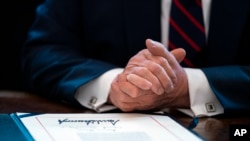The U.S. government plans to audit any company taking out more than a $2 million loan as part of the coronavirus relief program to make sure it needed the money, Treasury Secretary Steven Mnuchin said Tuesday.
Companies can have their loans forgiven if they spend the money on payroll, employee benefits, rent and utilities. But the government relief program came under sharp scrutiny, however, after several prosperous public companies disclosed they had taken out the loans that were intended to help small businesses with fewer than 500 employees survive during the coronavirus pandemic.
“This was a program designed for small businesses,” Mnuchin told CNBC. “It was not a program that was designed for public companies that had liquidity.”
He warned public companies that took the money they could face criminal liability if they do not refund the loans by May 7.
“The purpose of this program was not social welfare for big business,” Mnuchin said.
The Treasury chief told Fox Business, "Anybody that took the money that shouldn’t have taken the money, one, it won’t be forgiven and two, they may be subject to criminal liability, which is a big deal. I encourage everybody to look at this and pay back these loans now so we can recycle the money if you made a mistake.”
More than 220 public companies applied for at least $870 million from the program designed to keep small businesses afloat during the crisis. But among those who took out the loans were the high-end steak house chain Ruth’s Hospitality Group ($20 million), the AutoNation auto parts supply chain ($77 million) and the Los Angeles Lakers pro basketball team ($4.6 million), believed to be the second most valuable team in the National Basketball Association.
“I think that’s outrageous,” Mnuchin said of the loan to the Lakers, which the team said it repaid Monday. Ruth’s and AutoNation also said they have returned their loan money.
Other companies said they intend to keep the money and that they legitimately qualified for the forgivable loans.
The initial small business fund quickly ran out of the $349 billion available for loans until it was replenished last week with another $310 billion.
The government’s Small Business Administration says companies have to “certify in good faith” their loan request is “necessary.”
“It is unlikely that a public company with substantial market value and access to capital markets will be able to make the required certification in good faith, and such a company should be prepared to demonstrate to SBA, upon request, the basis for its certification,” the guidelines state.





